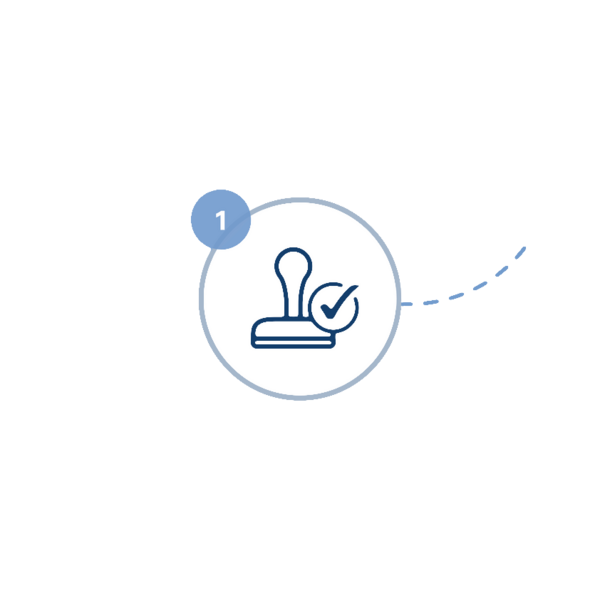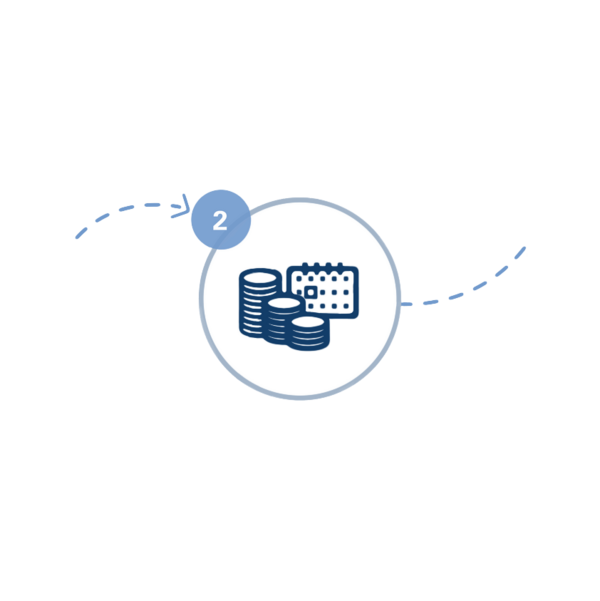Health insurance and tax returns
Your tax return benefits
Since 2010, health insurance providers have been able to transmit data electronically to the tax office under the Citizens’ Relief Act (Bürgerentlastungsgesetz). When your paid and reimbursed contributions, bonus and reward payments, and unemployment benefits are reported, this allows you to record all payments in your tax return, since the tax office only recognises data transmitted electronically.
This section explains everything about health insurance-related reporting to the tax office. If you have further questions, please contact your personal consultant – feel free to use our
Information on reporting data to the tax office
We report the following data to the tax office:
The tax office will only recognise data transmitted electronically in your tax return. For this reason, we must transmit this data in order for you to be able to record all amounts in your tax return.
*In consideration of the applicable tax law, the bonus payment and the tax allowance for family insured persons are to be allocated to the main insured person.
We always send the reports to your tax office in the second week of January. You will then receive a tax statement confirming your reported contributions, rewards and unemployment benefits, so you always have an overview of the data the tax office holds.
Our tip: Have you registered with
Entry of reported amounts in the tax return
To offset health insurance contributions, these must generally be entered in the ‘Anlage Vorsorgeaufwand’ schedule of your tax return.
Please note: We are not allowed to provide any tax information. If you have any questions, please contact your tax adviser, the tax office or an income tax assistance organisation.
SBK always reports this data to the tax office in the second week of January. You will then receive a tax statement confirming your reported contributions, rewards and unemployment benefits, so you always have an overview of the data the tax office holds.
Our tip: Have you registered with Meine SBK? In Meine SBK you have the convenient option of seeing your post from SBK at any time. Learn more about Meine SBK and find out how to register
Due to the requirement of the tax authorities, as of October 2021, all health insurers report contribution credits that result from a contribution correction and that have been offset against contributions from more than one year. In the reports, the offsetting is shown as ‘Reimbursed contributions’ and ‘Paid contributions’.
Please contact your tax adviser, an income tax assistance organisation or the tax office if you would like to know how this new situation will affect your tax return.
The tax office will only recognise data transmitted electronically in your tax return. For this reason, we must transmit this data in order for you to be able to record all amounts in your tax return.
To offset health insurance contributions, these must generally be entered in the ‘Anlage Vorsorgeaufwand’ schedule of your tax return.
Please note: SBK is not permitted to provide tax advice. To clarify questions of this nature, please contact your tax advisor, the tax office or an income tax assistance association.
Tax-related information on the SBK Retention Tariff
Based on tax regulations, we report the maximum possible reward to the tax authorities. It is irrelevant whether
Timing of reporting for the SBK Retention Tariff:
You can find all information on the SBK Retention Tariff
Tax-free bonus payments of up to €150 in the period 2021–2023
End of December 2021, the Federal Ministry of Finance announced a new regulation on the reporting of bonus payments, which could significantly reduce your tax burden. According to this, bonus payments from the cash bonus from bonus activities not paid by the insured person in the period 2021–2023 are tax-free up to €150* and are not reported to the tax office. Bonus activities not paid by the insured person include, for example, statutory check-ups and vaccinations.
From 2024, all non-self-financed bonus payments from the cash bonus will be reported to the tax authorities – regardless of their amount.
*In consideration of the applicable tax law, the bonus payment and the tax allowance for family insured persons are to be allocated to the main insured person.
Tax-related information about the SBK Bonus Scheme
The SBK Bonus Scheme has provided the option of choosing how you would like to receive your bonus:
Whether SBK is required to report your bonus to the tax office depends on which bonus option you choose. An overview is provided here:
| Bonus option | Reported by SBK to tax office | Specified in your tax return |
|---|---|---|
| Cash bonus | Yes | Yes |
| Health bonus | No | No |
How reporting works with the SBK Bonus Scheme

2021
Participation in the SBK Bonus Scheme

2022
You submit your booklet and SBK sends your bonus payment
The date of payment alone determines how it is assigned for tax purposes

2023
SBK reports the non-self-financed cash bonus to the tax office and you are informed of this
Frequently asked questions about reporting data to the tax office
The data is transmitted electronically to the Central Allowance Authority for Pension Assets (Zentrale Zulagenstelle für Altersvermögen, or ZfA). From there your data is sent to the Federal Central Tax Office for verification and then forwarded to the responsible tax office.
Only contributions that you yourself have paid to SBK are reported to the tax office.
The following types of contributions are reported:
We do not report contributions paid by other bodies, such as by your employer or a paying agent. These contributions will be reported to the tax office separately by these other bodies.
Reporting bonus payments for family members
If a relative insured through family insurance receives a payment through the Bonus Scheme, this reimbursement has to be assigned to the main insurant, whose membership is the basis for the family insurance. Important to know: this rule applies even if the reimbursement is paid directly to the family member’s own bank account, for example.
If your family member’s insurance status changes during the year
If a relative insured through family insurance starts a job during the year and is therefore required to have statutory insurance for themselves, the bonus they receive is reported under the status applicable at the time the bonus was paid. Example: a child insured through their father’s family insurance receives a bonus payment of €50.00 on 2 February 2022. The child starts working as a trainee on 1 August 2022 and is therefore required to have their own statutory insurance. The bonus payment is reported to the tax office on the father’s account, because the child was insured through the family insurance at the time of the transaction.
All of your payments and reimbursements for contributions occurring within a calendar year are reported to the tax office. If you pay contributions in advance, the paid contributions are reported to the tax office, whereby the payments are compared against your current contribution amount and excess payments are recorded for future obligations. Important to know: the tax office only recognises advance payments amounting to no more than three times the annual contribution.
Our tip: If you intend to make advance payments, please speak with us. We will help you determine how much you can pay in advance while avoiding ‘overpaying’ beyond the three-year limit.
If a tax audit of your employer, for example, results in SBK reimbursing you for insurance and benefits expenses such as those for
these reimbursements must be reported to the tax office through what is known as the MZ30 procedure, which is a compulsory notification process.
Until the 2018 tax year, health insurance providers only reported contributions and rewards to the tax office for customers who paid their contributions themselves if these customers had provided consent for data transmission. As of the 2019 tax year, SBK, like all other health insurance providers, has been obligated to report contributions and rewards electronically to the tax office for all customers – even those who have not provided consent for data transmission.
The legal basis for this is the second Act harmonising data protection law with Regulation (EU) 2016/679 and implementing Directive (EU) 2016/680, which was adopted on 20 November 2019.
Important to know: The tax office provides health insurance providers with customers’ missing tax IDs upon request in an automated system, so that these providers are able to report data to the tax office accordingly.